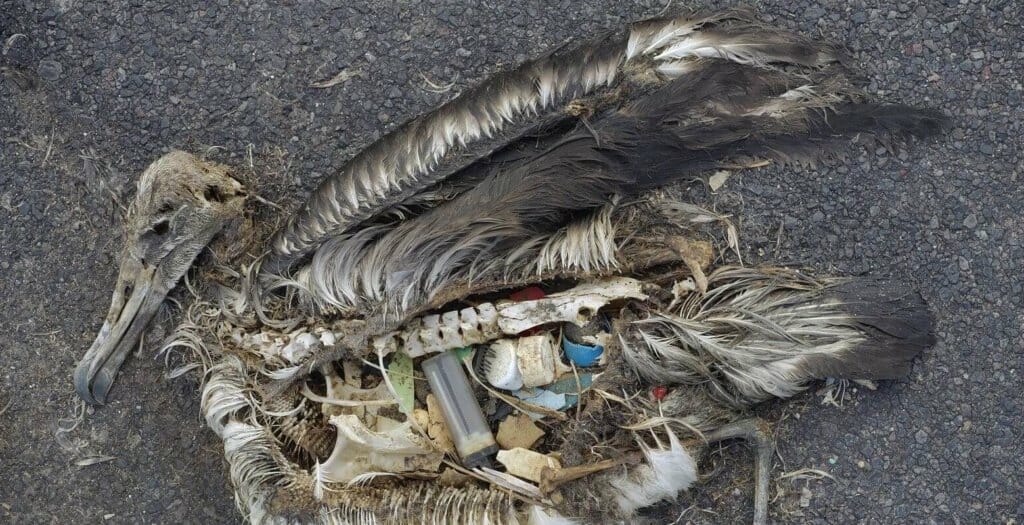New Studies Raise Hopes for Making Plastic Safer
Plastic detritus threatens to swamp the planet, but laboratories around the world are working on solutions, by finding ways to use energy more efficiently and by exploiting natural wastes. Plastic debris in the stomach of an albatross chick. (Chris Jordan, USFWS / Wikimedia Commons)
Plastic debris in the stomach of an albatross chick. (Chris Jordan, USFWS / Wikimedia Commons)
The good news is that safe plastic is not an impossible dream: novel ways to tackle the tide of discarded material engulfing the planet are under development.
One scheme absorbing US chemists will turn natural waste into natural polymers. Some day the crabmeat sandwiches in your packed lunch could be safely wrapped in transparent packaging fashioned from crushed crab shells and discarded wood chippings.
The protective wrapping would have all the strength of the polyethylene-based packaging that comes with millions of supermarket products, with one big difference. It will decompose naturally. Polyethylene is the most common form of plastic, with global demand expected to reach almost 100m tonnes in 2018.
Plastic polymer compounds are products of the petroleum industry and have changed lives the world over. But because plastic polymers are all but indestructible, they also promise to change lives everywhere for the worse, as empty plastic cups, soft drinks bottles and supermarket shopping bags amass in the oceans, along shorelines, and in what would otherwise be natural wilderness.
Researchers have already warned that long after humanity becomes extinct, a geological stratum rich in fragmented plastic toys, drinking straws and yoghurt pots could bear witness to the brief tenure of Homo sapiens.
Plastic detritus threatens to swamp the entire planet. Particles have been found in the Arctic ice, and plastic flotsam could carry dangerous infections to the most distant coral reefs.
But as the world’s nations falteringly begin to address the challenges of global warming and climate change, driven by profligate human use of fossil fuels, laboratories around the world have been working on possible solutions, both by finding ways to use energy more efficiently, and by exploiting natural wastes.
The latest study in ingenuity is described in the American Chemical Society’s journal ACS Sustainable Chemistry and Engineering.
Soil Additive
Researchers sprayed layers of the natural polymer chitin – the substance that provides the exoskeleton of the lobster or the locust – and the plant polymer cellulose to make a thin, flexible, transparent material that could one day replace PET, or polyethylene terephthalate. Cellulose is by far the most common natural polymer – unlike money, it really does grow on trees. Chitin may be the second most common: it is made by shellfish, insects and fungi.
But in the form of alternating layers, made by nanotechnologists – scientists who work in scales of a billionth of a metre – and then dried, the new product becomes strong, flexible and transparent, and something you could throw into the compost heap and watch turn back into nourishing soil.
Such a product is a long way from any commercial manufacture: a lot more needs to be achieved, and many hurdles have to be cleared. But such studies are once again evidence that the chemists and engineers are thinking hard.
“We have been looking at cellulose nanocrystals for several years and exploring ways to improve those for use in lightweight composites as well as food packaging, because of the huge market opportunity for renewable and compostable packaging, and how important food packaging overall is going to be as the population continues to grow,” said Carson Meredith, of Georgia Institute of Technology’s school of chemical and biomolecular engineering.
“Our material showed up a 67% reduction in oxygen permeability over some forms of PET, which means it could in theory keep foods fresher, longer.”
Your support matters…Independent journalism is under threat and overshadowed by heavily funded mainstream media.
You can help level the playing field. Become a member.
Your tax-deductible contribution keeps us digging beneath the headlines to give you thought-provoking, investigative reporting and analysis that unearths what's really happening- without compromise.
Give today to support our courageous, independent journalists.






You need to be a supporter to comment.
There are currently no responses to this article.
Be the first to respond.